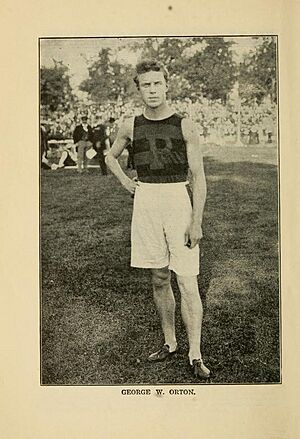George Orton facts for kids
George Washington Orton (born January 10, 1873 – died June 24, 1958) was an amazing Canadian runner. He competed in middle and long-distance races. In 1900, he made history by becoming the first Canadian to win a medal at the Olympic Games. He won a bronze medal in the 400 meter hurdles. Just 45 minutes later, he won a gold medal in the 2500 meter steeplechase race!
Contents
Early Life and Amazing Comeback
George Orton was born in Strathroy, Ontario, Canada. When he was only three years old, he had a terrible accident. He fell out of a tree and became paralyzed. This fall caused a blood clot in his brain and badly hurt his right arm.
He couldn't walk until he was 10 years old. By the time he was 12, he had fully regained his ability to move around. This was an incredible recovery!
Education and Running Success
Orton studied at the University of Toronto, earning a degree in Romance Languages in 1893. He then received a scholarship to the University of Pennsylvania in 1893. There, he completed his Masters degree in 1894 and his Ph.D. in Philosophy in 1896.
While studying, he also became one of the best middle-distance runners in the world. He won a record 17 national titles in the United States. He also won 7 titles in Canada and one in the United Kingdom. He was a champion in many races. He won the U.S. one-mile championship six times. He also won the two-mile steeplechase seven times.
In 1892, while at the University of Toronto, Orton set a mile record of 4 minutes and 21.8 seconds. This record stood for 42 years! In total, he won 131 races. This included an amazing 33 national and international championships.
Olympic Glory in Paris
The biggest moment in Orton's career was the 1900 Summer Olympics in Paris, France. Orton competed in three official Olympic events. These were two steeplechase races and the 400 meter hurdles.
He also ran in other "handicap" races. In these races, he had to give up time or distance to other runners. This was because he was so successful! He won a bronze medal in the 400 meter hurdles. The last hurdle in this race was a water jump.
Just 45 minutes later, even though he was feeling sick, Orton won the gold medal. This was in the 2500 meter steeplechase. He set a new world record of 7 minutes and 34.4 seconds. The next day, still feeling unwell, he finished fifth in the 4000 meter steeplechase.
A Canadian Hero, Not American
Back then, Olympic athletes didn't always represent their home country. Nationality wasn't as important. They ran as individuals or for their university or club. Countries were not officially listed next to athletes' names until the 1908 Olympics.
Later, the Olympic committee added nationalities to past results. This is how Orton was mistakenly listed as American for over 70 years. His name in the record books read "George Orton-U.S.A." Eventually, this mistake was corrected. His medals were given to Canada's total, where they belonged.
Orton is also known as the first disabled athlete to win an Olympic gold medal. For many years, he kept his disability a secret. His right arm and hand were permanently damaged from his childhood accident.
"Father of Philadelphia Hockey"
George Orton was known as "The Father of Philadelphia Hockey." He brought ice hockey to Philadelphia in 1896 while at the University of Pennsylvania. He even captained the first team there.
Orton helped build the first indoor ice arena in Philadelphia. This helped the sport become very popular. In 1897, Orton started the Philadelphia Hockey League. The next year, he formed the Quaker City Hockey Club. This team played in a very competitive league.
From 1920 to 1922, Orton coached the Penn Varsity hockey team. Years earlier, at the University of Toronto, he helped start their first hockey team. He also played soccer for the 'Varsity' team in Toronto.
Orton was a talented athlete in many sports. He played soccer for Canada against a U.S. all-star team in 1891. In 1910, he played for the Philadelphia all-stars. Even at 50 years old in 1923, he was still playing soccer! He was also a member of several sports clubs. He was the secretary of the Rose Tree Fox Hunting Club for 43 years.
Beyond sports, Orton was a member of the American Academy of Poets. He could also speak nine languages fluently!
Coaching and Writing
Orton took part in the first Penn Relay Carnival in 1895. Later, he became the track coach at Penn. He wrote an important training guide for runners called "Distance and Cross Country Running" in 1903. He also wrote a book about the history of Penn Athletics.
He managed the Penn Relays from 1919 to 1925. He helped this event grow into one of the greatest annual track and field competitions in the world.
Orton has been honored in many ways. He was inducted into Canada's Sports Hall of Fame and the Canadian Olympic Hall of Fame. He is also in the University of Pennsylvania Hall of Fame and the Philadelphia Sports Hall of Fame.
He also wrote the "Bob Hunt" book series. These books were for young men and boys who loved the outdoors. In 1903, Orton co-founded Camp Tecumseh in New Hampshire. Ten years later, he started Camp Iroquois. This was the first overnight athletic camp for girls.
A book about his life, The Greatest Athlete (you've never heard of), was published in 2019.
Orton was also a writer about sports and running. In 1911, he worked with Thomas Cahill (soccer) on a soccer guide.
George Orton passed away on June 24, 1958, at the age of 85.
See also
 In Spanish: George Orton para niños
In Spanish: George Orton para niños
 | Janet Taylor Pickett |
 | Synthia Saint James |
 | Howardena Pindell |
 | Faith Ringgold |


